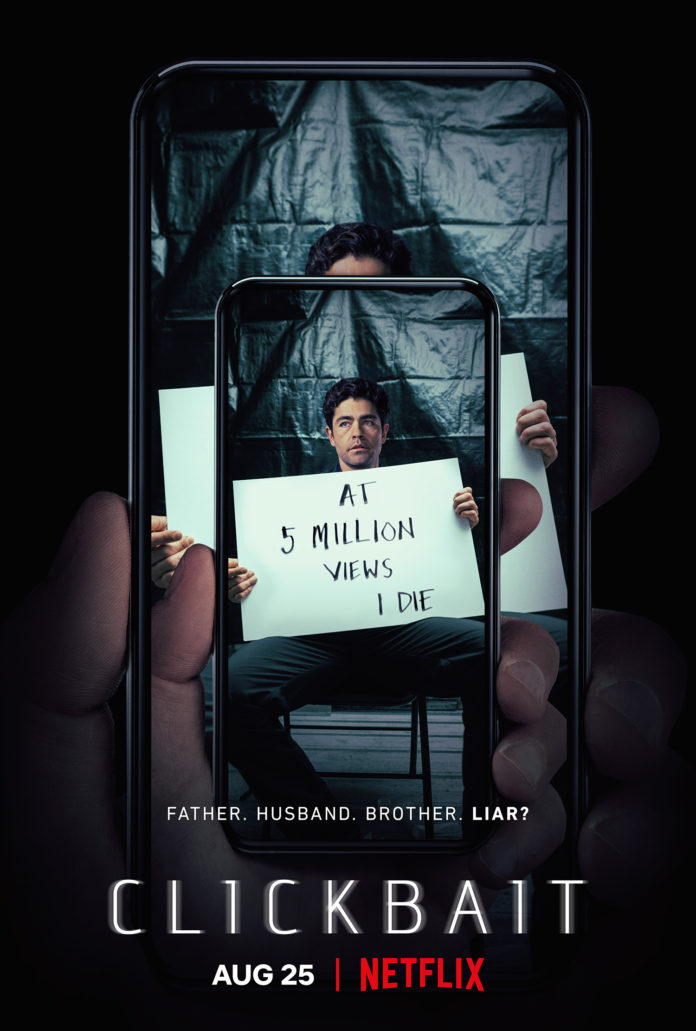The following review contains spoilers for the entirety of Clickbait.
The Netflix series Clickbait was named perfectly: the show lures its audience with a compelling first episode and strong plotline, but leaves the audience with a disappointing resolution. Or does it perfectly convey its message with an unorthodox execution?
The miniseries—which premiered in late August—begins with the kidnapping of Nick Brewer, one of the show’s main characters. Each episode of the ten episodes is seen through a different character’s lens, providing the audience with a strong overview of the characters’ personalities and experiences as they undergo the tragic kidnapping of their brother, husband, father and friend.
Shorter, one-season television shows, known as miniseries, have grown in popularity over the course of the pandemic. After a year-and-a-half of working and learning online, our attention spans have dropped dramatically, which allows shows like Clickbait, Mare of Easttown, the Queen’s Gambit, the Last Dance, the Undoing, and many more to pull viewers in for an eight- to ten-hour viewing session.
With plenty of options for binge-worthy miniseries, why is Clickbait gaining traction?
The aspect that differentiates this Netflix-original from other mystery dramas is the unique nature of the crime itself. Emulating another popular Netflix show, Black Mirror, Clickbait highlights the methods in which modern technology and social media affect our society—whether through the viral video of kidnapped Brewer or an analysis of the dangers of online dating and catfishing.
Clickbait opens as we see a video of Nick Brewer, beaten and bloody, holding up signs stating, “I abuse women” and “At five million views, I die.” The series first focuses on Brewer’s family: Pia, his sister; Sophie, his wife; and his two sons, Ethan and Kai. The people closest to Brewer are shocked, refusing to believe the misogynistic claims leveled at Brewer and desperately working to get the video taken down.
The video successfully hits five million views as Brewer’s body is found. The audience furthers their knowledge of the family, including the reveal of Sophie Brewer’s affair with a man who ends up being a suspect in the murder investigation. We then find out that Nick had accounts on multiple dating websites, forming connections with numerous women. One of Brewer’s online mistresses—nicknamed Maggie Oxley—committed suicide due to Nick’s abusive messages, taking both the investigation and the series in a new direction.
The many twists and turns in the series keep the audience engaged, and the in-depth character analyses of each episode make them relatable. The audience even ends up sympathetic to Nick Brewer, who is characterized as a womanizing scumbag throughout most of the show.
Despite the decently engaging plot, the potential of the show outweighs the result. Most audience members will view the resolution as lazy and unsatisfying, depriving viewers of one of the best parts of mystery dramas: predicting the identity of the culprit. In the final episodes, the audience discovers that the murderers are irrelevant side characters whom the audience has no attachment to. This leaves most viewers feeling like something is missing.
While there is almost no chance for the audience to guess the culprit, the concept of a sweet elderly couple being capable of a violent murder sticks in the minds of the audience. By making a seemingly irrelevant couple the center of the chaos, the writers create a pair of underdeveloped anti-villains. In most perceptions of media, the elderly represent the defenseless, which is why situational irony is such a large component in the development of the show: the wholesome elderly couple are murderers, the “abusive” womanizer is an innocent family-man, and the sorrowful widow cheated on her husband.
These parallels continue throughout the series, displaying the versatility of the characters, all of whom seem to have morally gray areas. Whether the audience likes them or not, the characters seem real, with no distinct villains or heroes. In short, Clickbait is a cautionary tale, where absolutely anyone has the potential to fall victim to the issues created by our modern internet culture. Even Dawn, the sweet old lady seeking solace on the internet, ends up contributing a cold-blooded murder. And while Clickbait has astounding potential but an uneventful resolution, those who are willing to overanalyze the themes of the miniseries may enjoy it more than your average armchair detective.












